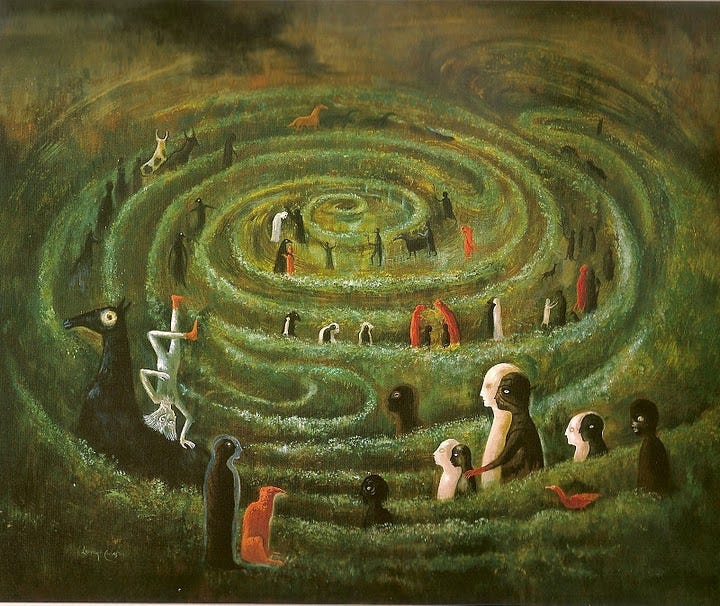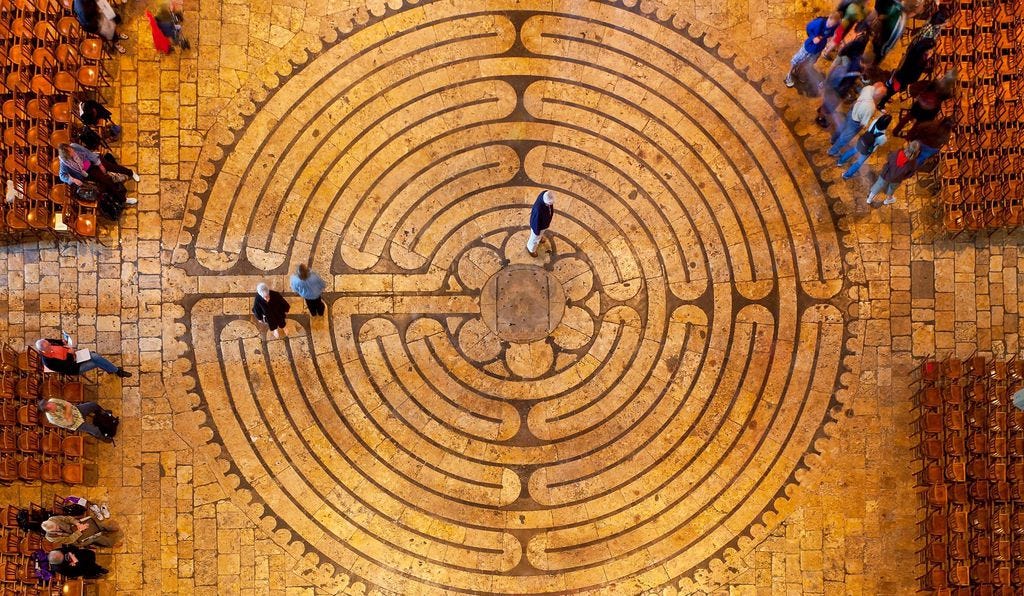#68. LABYRINTH / LABERINT
Wine was merely one key among many others / El vino no era sino una llave más entre muchas otras
THE LABYRINTH
Zeus, Zeus himself could not undo these nets
Of stone encircling me. My mind forgets
The persons I have been along the way,
The hated way of monotonous walls,
Which is my fate. The galleries seem straight
But curve furtively, forming secret circles
At the terminus of years; and the parapets
Have been worn smooth by the passage of days.
Here, in the tepid alabaster dust,
Are tracks that frighten me. The hollow air
Of evening sometimes brings a bellowing,
Or the echo, desolate, of bellowing.
I know that hidden in the shadow there
Lurks another, whose task is to exhaust
The loneliness the braids and weaves this hell,
To crave my blood, and to fatten on my death.
We seek each other. Oh, if only this
Were the last day of our antithesis!
Jorge Luis Borges (translated by John Updike)
LABYRINTH
A universal symbol of the unconscious. Labyrinths are constructions with an intricate and complex structure, with no apparent purpose beyond reaching the center and finding the way out. We usually find a monster, a luminous being, a divinity, or a mirror in the center of the labyrinth, however, the idea is always the same: the person discovers its true nature. The center embodies the lost unity of our inner essence, masked by the multiplicity of desires of the superficial personality with which we identify. Early rituals use the labyrinthine forms to perturb the neophytes' consciousness and to collapse all reference points that allow rational, linear orientation. Any attempt to apply the logic to overcome initiation is doomed to failure. We must accept the paradox of being in a tortuous, confused, oppressive and chaotic environment, which, from the air, reveals a unitary, clear, liberating and orderly structure. Intuition is the compass of mazes. Once the initial proof is passed, the way out must be found, that is, to integrate the knowledge of the eternal mystery into the state of consciousness of everyday life. It is often forgotten that the return track of a maze is completely new. Without Ariadne's thread Theseus would not have been able to find the road back after killing the Minotaur. The longer and more difficult the road, the greater the transformation. As the poet said, we must pray for the road to Ithaca to be long, full of adventures and full of knowledge.
“He also drank wine, but it was never pleasure that he was after. He was essentially driven to do so by a mixture of thirst for adventure and a thirst for knowledge. He did not travel to settle in unknown regions, but as a geographer. Wine was merely one key among many others, one of the main doors to the labyrinth.”
Approaches: Drugs And Ecstatic Intoxication by Ernst Jünger
EL LABERINTO
Zeus no podría desatar las redes
de piedra que me cercan. He olvidado
los hombres que antes fui; sigo el odiado
camino de monótonas paredes
que es mi destino. Rectas galerías
que se curvan en círculos secretos
al cabo de los años. Parapetos
que ha agrietado la usura de los días.
En el pálido polvo he descifrado
rastros que temo. El aire me ha traído
en las cóncavas tardes un bramido
o el eco de un bramido desolado.
Sé que en la sombra hay Otro, cuya suerte
es fatigar las largas soledades
que tejen y destejen este Hades
y ansiar mi sangre y devorar mi muerte.
Nos buscamos los dos. Ojalá fuera
éste el último día de la espera.
Jorge Luis Borges
LABERINT
Símbol universal de l’inconscient. Els laberints són construccions amb una estructura intricada i complexa, sense una aparent finalitat més enllà d’arribar al centre i trobar el camí de sortida. Solem trobar un monstre, un ésser lluminós, una divinitat o un mirall al centre dels laberints, sigui com sigui, la idea sempre és la mateixa: la persona descobreix la seva veritable naturalesa. El centre encarna la unitat perduda de l’essència interna, emmascarada per la multiplicitat de desitjos de la personalitat superficial amb què ens identifiquem. Els rituals iniciàtics utilitzen les formes laberíntiques per pertorbar la consciència del neòfit i esfondrar tots els punts de referència que permetin una orientació racional, lineal. Qualsevol intent d’aplicar la lògica per superar la iniciació està condemnada al fracàs. Cal acceptar la paradoxa de trobar-nos en un entorn tortuós, confós, opressiu i caòtic que vist des de l’aire revela una estructura unitària, clara, alliberadora i ordenada. La intuïció és la brúixola dels laberints. Un cop superada la prova iniciàtica cal trobar el camí de sortida, o sigui, integrar el coneixement del misteri etern a l’estat de consciència de la vida quotidiana. Sovint s’oblida que el trajecte de retorn d’un laberint és completament nou. Sense el fil d’Ariadna, Teseu no hauria trobat el camí cap a l’exterior després de matar al Minotaure. Com més llarg i difícil sigui el recorregut, més gran és la transformació. Ja deia el poeta que hem de pregar perquè el camí a Ítaca sigui llarg, ple d'aventures i ple de coneixences.
“Bebía también vino, mas jamás era el placer lo que le inducía a ello. Le empujaba esencialmente una mezcla de sed de aventura y conocimiento. No viajaba para sentarse en regiones desconocidas, sino como geógrafo. El vino no era sino una llave más entre muchas otras, una de las puertas de entrada al laberinto.”
Acercamientos: drogas y ebriedad d’Ernst Jünger








